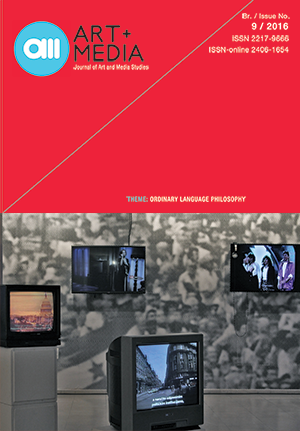Wittgenstein’s “Simple Object”, The Phenomenological Gaze and the Representation of Spatial ‘Things’ in Modernism/Postmodernism
Wittgenstein’s “Simple Object”, The Phenomenological Gaze and the Representation of Spatial ‘Things’ in Modernism/Postmodernism
Author(s): Slobodanka Vladiv-GloverSubject(s): Analytic Philosophy
Published by: Fakultet za medije i komunikacije - Univerzitet Singidunum
Keywords: affectivity; space; silence; the ineffable; the as if of signification; violence of thought
Summary/Abstract: By examining a series of paintings by Magritte and etchings by Escher, with reference to several literary texts, this article traces the aesthetic function of the representation of space and silence in Modernist art at the beginning of the 20th century. In reading the Modernist work of art against the theory of language proposed by Ludwig Wittgenstein in his 1921 Tractatus Logico-Philosophicus, this article also suggests that the representation of objects testifies to a paradigm shift in European aesthetics at the beginning of the 20th century which involves a repudiation of affectivity as a mode of experience and expression prevailing as far back as Classical Antiquity, and a move into the orbit of the phenomenological gaze which shifts the space of representation beyond the actually visible or representable. This shift makes experience into an experience of language or of the process of signification, which has the effect of symbolic ‘castration’ (Freud), bringing into existence the ‘split’ subject (Lacan). The alienating split of the subject by the signifier (‘the object’) is thematised as violence (cannibalism) in modernism and inhertited by postmodernism, as demonstrated by critical reference to Maurice Blanchot’s Thomas the Obscure (1932), Patrick Sűskin’d Perfume, and Milorad Pavić’s Dictionary of the Khazars.
Journal: AM Časopis za studije umetnosti i medija
- Issue Year: 2016
- Issue No: 09
- Page Range: 81-91
- Page Count: 11
- Language: English

